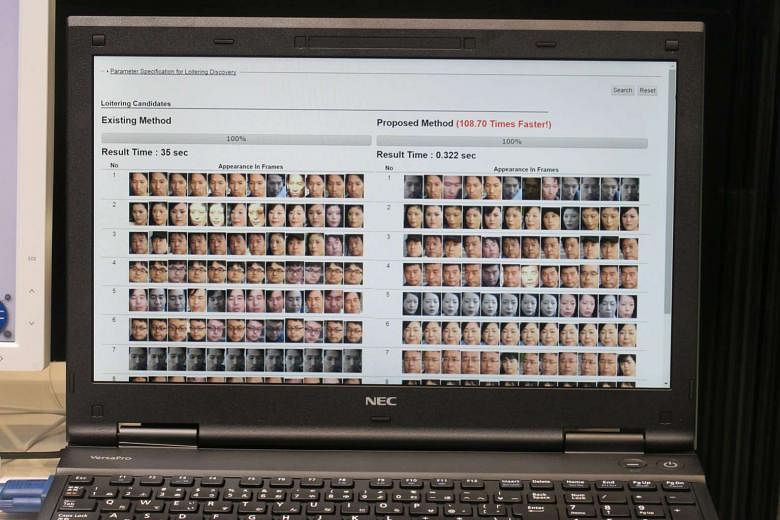New software developed by Japanese information technology giant NEC promises to help law enforcement agencies weed out criminal suspects at more than 100 times the speed of current systems.
Launched on Monday on the eve of a two-day NEC trade show in Tokyo, the NeoFace Image data mining system taps artificial intelligence to scan video footage for specific individuals.
NEC said its latest software can scan through one million faces captured in closed-circuit television footage within 10 seconds, and that this could come in handy in criminal forensic investigations and in finding missing persons.
"For example, you may have 40 videos of a crime scene to find a suspicious person, and you need to look through all these videos, which will take a lot of time and effort to prove that the same person keeps appearing in all of them," a spokesman said on Monday at a media preview of the trade show.
"But the new approach matches people with similar facial features and groups them together," she said, adding that the system works regardless of the quality of the video.
Other data that can be gleaned from this information includes a person's movements, the number of times one might have visited a specific location as well as the people one might have met.
"In recent years, there is growing demand for advanced analysis of camera footage for use in security and marketing applications," said Mr Noritaka Taguma, the general manager of NEC's transport and city infrastructure division.
-
Japan goes big on AI
-
Japan is looking towards artificial intelligence (AI) as a key driver of innovation. Here are several recent initiatives by top Japanese firms.
TOSHIBA AND DENSO
Conglomerate Toshiba and automotive components firm Denso announced last month a tie-up to jointly develop AI technology in image recognition, for advanced driver assistance and autonomous driving.
With the technology, computers will identify road traffic situations like obstacles and road markings, availability of road space for driving, and potentially dangerous situations.
PANASONIC
The consumer electronics firm said last month it is partnering US tech giant IBM to develop smart homes powered by AI, with their "self-learning systems" to be used in a smart city to be built in south-east Berlin by 2018.
They plan to use AI to control temperature and humidity, using data from sensors to understand residents' habits.
TOYOTA
The carmaker will start selling a 10cm-tall talking robot called Kirobo Mini in Japan from early next year, it revealed last month. The robot, equipped with cameras, speakers and Bluetooth, will recognise one's facial expressions and determine the mood and is meant to be a "conversation partner".
HONDA
Honda will lead its global AI efforts from a new lab in Tokyo from next year, combining existing teams in Silicon Valley, Europe and Japan to ensure closer interaction between scientists and developers.
The carmaker is working with mobile giant Softbank - known for its humanoid robot Pepper - to develop technologies allowing cars to talk to drivers and perceive their emotions.
SONY
Electronics firm Sony has created two new pop songs, it said in September, with its AI software picking out music styles from a catalogue of 13,000 songs. The algorithm analyses the characteristics of each song, including its rhythm, pitch and harmony, to compose music in different genres.
Walter Sim
The new program "meets this demand by providing high-speed, high-precision searches for persons who appear in specific patterns, which could not be achieved through manual searches or conventional technology", he said.
NEC, which runs a research laboratory and a cyber security outfit in Singapore, is a world leader in biometric technology.
Its biometric systems are being used in more than 40 territories, including in Singapore's passport and Macau's border control systems. A deal was announced in May for NEC to provide its facial recognition technology to New York's John F. Kennedy Airport.
In Japan, the technology is also being used in visitor passes to Universal Studios as well as to prevent ticket scalping at concerts.
The facial recognition technology market is worth US$200 billion (S$278 billion) and growing by about 20 per cent annually, said NEC principal research fellow Hitoshi Imaoka, who does research in facial recognition technology.
He said on Monday that some new areas that NEC is working on developing include the use of facial recognition in cashless payment and, in hospitals, the identification of patients without the need to register each time.
On the NeoFace Image system, he acknowledged that it is not always foolproof but said: "In the United States, it is common understanding that the biometric approach combines multiple methods, such as fingerprints or passwords, to have more accuracy."


